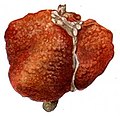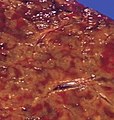Difference between revisions of "Liver"
Jump to navigation
Jump to search
m (→Gross processing: Specified) |
m (→Tissue sampling: Linked) |
||
| Line 5: | Line 5: | ||
==Tissue sampling== | ==Tissue sampling== | ||
*'''[[Autopsy]]''' | *'''[[Autopsy]]''' | ||
| − | *'''Liver biopsy''' | + | *'''[[Liver biopsy]]''' |
==Gross processing in autopsy== | ==Gross processing in autopsy== | ||
Revision as of 03:53, 20 December 2019
Author:
Mikael Häggström [note 1]
Contents
Tissue sampling
Gross processing in autopsy
Make consecutive liver slices, such as in the sagittal or coronal plane.
Basic gross examination
- Inspect the color and texture of the surfaces, including external and cut surfaces. Potential pathologies:
- Look for any focal change in the liver volume, mainly any tumor.
- Determine liver weight.
Gross report
- Weight
- Color and texture of cut surfaces
- Any focal change
Notes
- ↑ For a full list of contributors, see article history. Creators of images are attributed at the image description pages, seen by clicking on the images. See Patholines:Authorship for details.
Main page
References
Image sources



